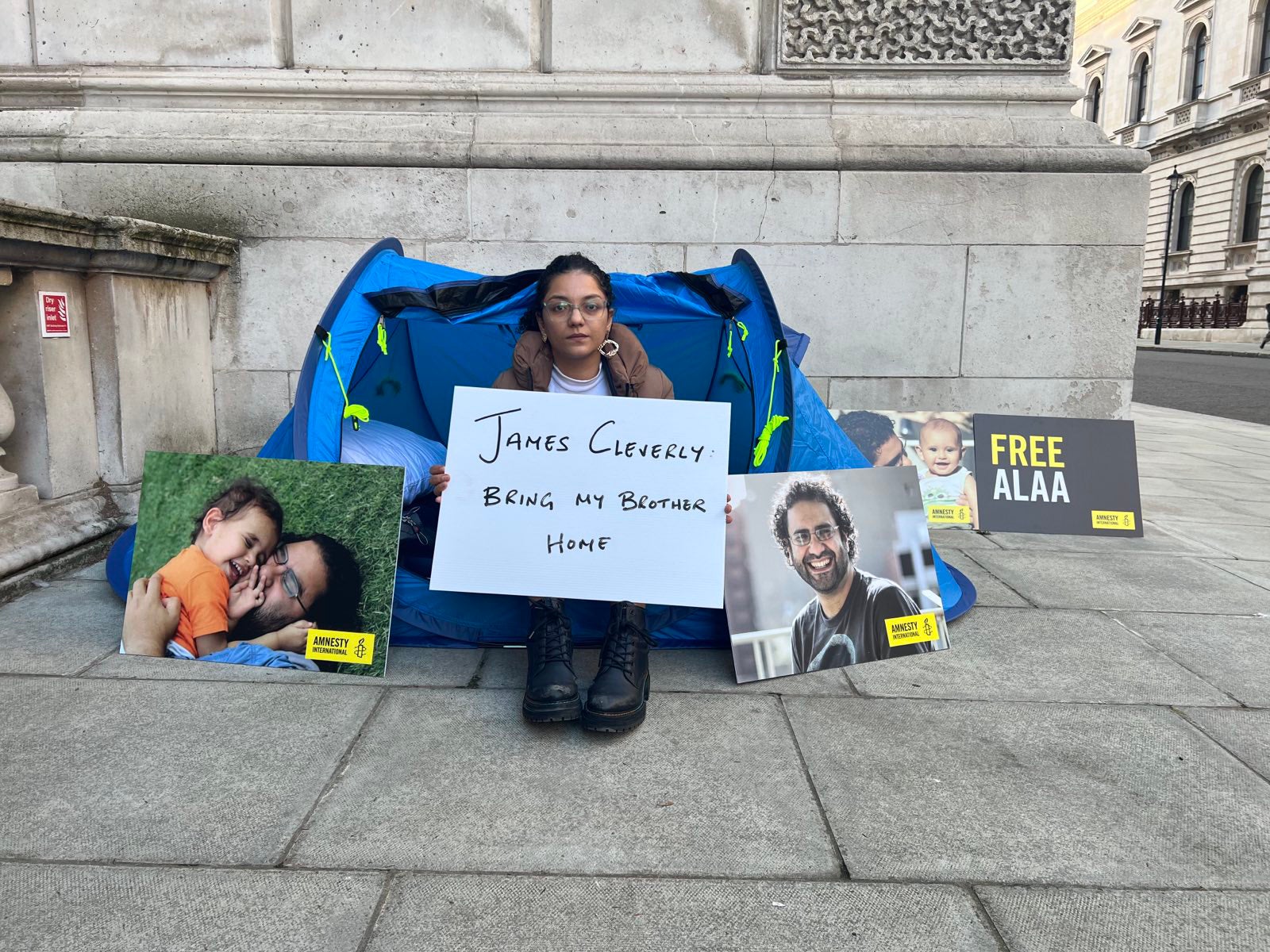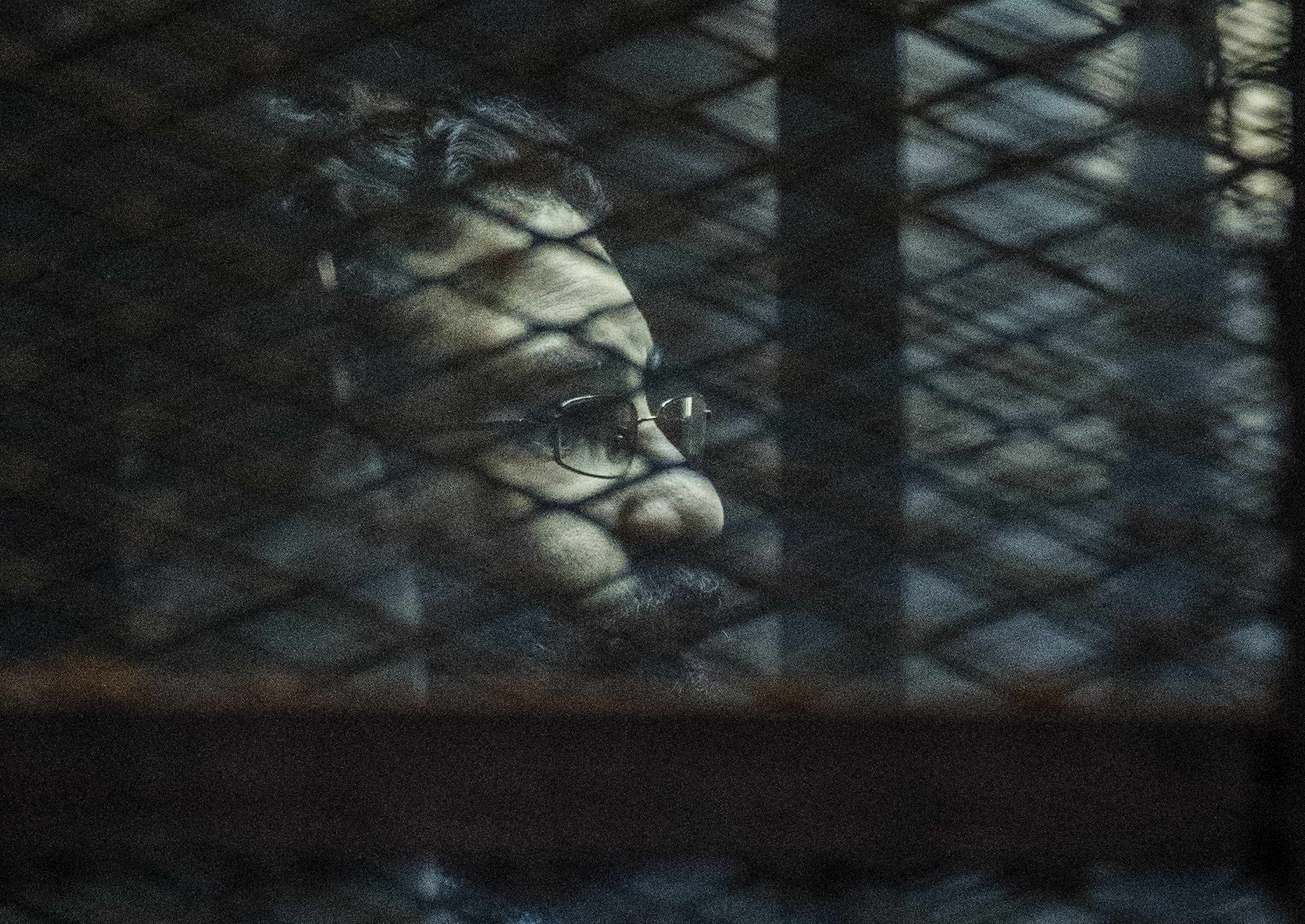‘At death’s door’: Family of Briton on hunger strike in Egypt urges action ahead of Cop27
‘If the UK does not engage right now the Egyptians authorities will see it as a green light to let him die,’ says sister Alaa Abdel-Fattah

Your support helps us to tell the story
From reproductive rights to climate change to Big Tech, The Independent is on the ground when the story is developing. Whether it's investigating the financials of Elon Musk's pro-Trump PAC or producing our latest documentary, 'The A Word', which shines a light on the American women fighting for reproductive rights, we know how important it is to parse out the facts from the messaging.
At such a critical moment in US history, we need reporters on the ground. Your donation allows us to keep sending journalists to speak to both sides of the story.
The Independent is trusted by Americans across the entire political spectrum. And unlike many other quality news outlets, we choose not to lock Americans out of our reporting and analysis with paywalls. We believe quality journalism should be available to everyone, paid for by those who can afford it.
Your support makes all the difference.The sister of a British citizen at risk of death on a hunger strike in jail in Egypt has started a sit-in outside the Foreign Office in London, demanding the authorities urgently secure his release ahead of next month’s Cop27 hosted by the North African nation.
Sanaa Seif said the family fears a “dangerous point” was approaching for Alaa Abd El-Fattah, a British-Egyptian rights activist and software developer who has spent most of the last decade behind bars in Cairo.
This week the Amnesty International prisoner of conscience reached his 200th day with no food, surviving on just 100 calories a day, in protest of the Egyptian authorities’ refusal to grant him a consular visit. This is despite his case being raised twice by former prime minister Boris Johnson, and Liz Truss, as foreign secretary, telling parliament she was “working very hard for his release”.
Ms Seif’s MP, David Lammy, the shadow foreign secretary, attended the protest on Wednesday and said “it is a sign of their desperation and the chronic lack of progress” that the family felt they needed to take this step.
“Alaa is a British citizen at death’s door, languishing in prison for his political beliefs,” he said.
Ms Seif, herself an activist who has been jailed in Egypt three times, told The Independent she was starting the sit-in now as the timing was critical. In a few weeks’ time, a high-level British delegation will join world leaders, politicians, experts and journalists for Cop27 to discuss the climate crisis.
She fears that if no “tangible steps” are taken to at least secure a meeting to discuss Abd El-Fattah before the summit it would set a “dangerous precedent” for her brother and any British citizen in Egypt.
“I am worried that if they engage normally that is the message to the Egyptian authorities that it doesn’t matter whether he lives or dies, whether the British consulate gets access or not to their citizen, as it will not affect our relationship,” she said.
“It sets a horrible precedent for any British citizen, not just those in prison, but even for tourists that face a problem and go to a police station to file a report. The message is that the British passport means nothing in Egypt.”
Mr Lammy said it was “imperative” that action be taken now.
“As the eyes of the world turn to Egypt as host of COP27, this grave situation requires the foreign secretary’s urgent intervention,” he added.
“It is now imperative that he meet with Alaa’s family and explain the steps he is taking to ensure Alaa’s welfare and secure his release.”
A spokesperson for the FCDO told The Independent that they were “working hard to secure Alaa Abd El-Fattah’s release”.
“We continue to raise his case at the highest levels of the Egyptian government. The foreign secretary most recently raised his case when he met Egyptian foreign minister Shoukry at the United Nations General Assembly last month,” they added.
The family have repeatedly said that time was running out for her brother who now looks “skeletal”. Ms Seif’s mother, London-born mathematics professor Laila Soueif, visited her son in prison on Wednesday. He has lost so much weight, he is unable to walk long distances and struggles to stand.
“We don’t know when his body will fail him, 100 calories is not enough to survive,” Ms Seif said. “He doesn’t have much fat remaining. We are approaching a dangerous point.”
Alaa is a British citizen at death’s door, languishing in prison for his political beliefs
Mr Abd El-Fattah, 40, has been jailed by every Egyptian president in his lifetime and has spent most of the past decade behind bars.
Together with other family members, he has been repeatedly targeted by the administration of president Abdel Fattah el-Sisi, the country’s ex-army chief who stormed to power after a 2013 military coup that ousted unpopular Muslim Brotherhood leader Mohammed Morsi, who himself subsequently died in prison.
The software developer and father is currently serving his latest five-year sentence, handed down following a trial labelled a “sham” by rights groups. He was convicted on charges of spreading false news after he shared social media posts that were critical of terrible prison conditions under the military-backed regime.
Right groups also reported that he was beaten and tortured on entry to Tora prison, in Cairo, and for months was barred access to books, writing implements, sunlight, a mattress and exercise, as well as a consular visit. Egypt has repeatedly denied any accusations it treats prisoners poorly or that it holds political prisoners.
But it was only after intense pressure from the UK that his conditions were meagrely improved and he was moved to Wadi Natroun prison, in the desert.

But Ms Seif said he still does not get to see the sun. He is only allowed out of his cell for 30 minutes a day in an enclosed space. The Egyptian authorities have barred him access to radio or any newspapers.
She urged the UK’s new foreign secretary James Cleverly to “cut through hate chaos and finish the job that the government has been claiming for months that it is working on”. She said raising the case was not enough, and he must be freed. She added that other countries including France and the US have managed to secure the release of their citizens jailed in similar circumstances in Egypt.
“I honestly would feel like there will be no hope for Alaa if the [British authorities] do not engage right now,” Ms Seif said as she prepared for the start of the sit-in.
“The Egyptians authorities will interpret it as a green light to let him die.”





Join our commenting forum
Join thought-provoking conversations, follow other Independent readers and see their replies
Comments